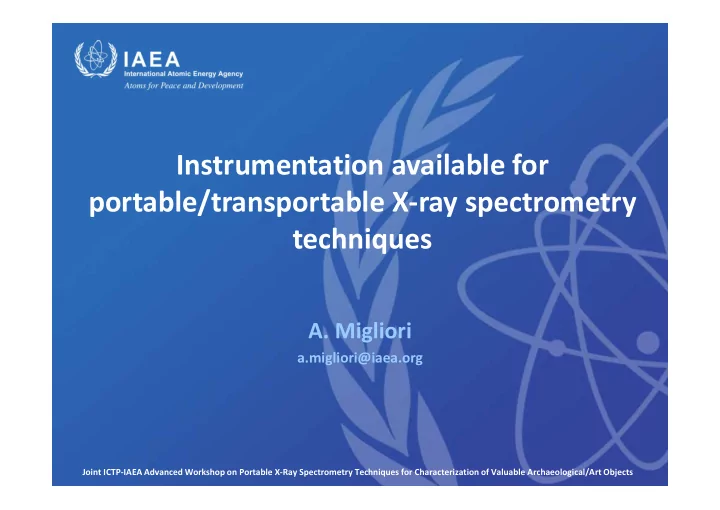

Instrumentation available for portable/transportable X-ray spectrometry techniques A. Migliori a.migliori@iaea.org Joint ICTP-IAEA Advanced Workshop on Portable X-Ray Spectrometry Techniques for Characterization of Valuable Archaeological/Art Objects
Hand-held analyzer State-of-the-art technology in miniaturized X-ray sources , Integrated Pocket PC technology for digital signal processing , telecommunications, and solid state reliability. GPS, wireless transmission, and integrated data analyses are being added rapidly expanding the technology and its applications. Joint ICTP-IAEA Advanced Workshop on Portable X-Ray Spectrometry Techniques for Characterization of Valuable Archaeological/Art Objects
Hand-held analyser: features Handheld XRF analyzer (Niton XL3t, GOLDD): • Miniaturized air-cooled X-ray tube • Thin Ag anode in transmission geometry • Max. operational values: 50 kV, 200 μA, 2.5 W • SDD detector: 30 mm 2 , 178 eV@MnKα Handheld XRF measurements of a XVI century Mexican feather headdress) at the Ethnology museum of Vienna. Joint ICTP-IAEA Advanced Workshop on Portable X-Ray Spectrometry Techniques for Characterization of Valuable Archaeological/Art Objects
Absorption filters as beam modifier Titanium Filter transmission curve % Absorption T Edge R Low energy x-rays are A N Very high energy absorbed S x-rays are transmitted M I T T X-rays above the absorption edge E energy are absorbed D ENERGY Ti Cr The transmission curve shows the parts of the source spectrum that are transmitted and those that are absorbed Joint ICTP-IAEA Advanced Workshop on Portable X-Ray Spectrometry Techniques for Characterization of Valuable Archaeological/Art Objects
Absorption filters 40 kV 3 10 Filter: Ni\V\Kapton Counts Background decrease: 2 10 100 @19 keV: 3 – 4 times 80 1 10 60 40 @5-15 keV: 10 – 100 times 20 5 10 15 0 10 5 10 15 20 25 30 Energy (keV) Joint ICTP-IAEA Advanced Workshop on Portable X-Ray Spectrometry Techniques for Characterization of Valuable Archaeological/Art Objects
Absorption filters (Ag anode) Joint ICTP-IAEA Advanced Workshop on Portable X-Ray Spectrometry Techniques for Characterization of Valuable Archaeological/Art Objects
HH XRF - Conditions Material Condition Condition Light Low Main High Voltage Filter Voltage Filter Voltage Filter Voltage Filter (kV) (mil) (kV) (mil) (kV) (mil) (kV) (mil) 4 Al + 1 3 Mo + 4 Mining 8 - 20 1 Cu 38 50 Ti + 4 Fe Fe 4 Al + 1 Soil 8 - 20 1 Cu 38 Ti + 4 Fe 4 Al + 1 Alloy 8 - 15 1 Fe 38 Ti + 4 Fe 3 Mo + 4 Plastic 8 - 20 1 Cu 40 Fe Joint ICTP-IAEA Advanced Workshop on Portable X-Ray Spectrometry Techniques for Characterization of Valuable Archaeological/Art Objects
HH XRF Analysis of a feather headdress • 16th century feather headdress in the Museum of Ethnology Vienna is the most renowned of the few remaining pre- Columbian “Arte Plumaria” artefacts • The recorded history of the headdress begins in 1596, when it is first mentioned in the estate inventory of the art collection of Archduke Ferdinand II of Tyrol at Ambras Castle Analytical Questions: • Metal ornaments: Composition? • Two types • Coated brass ornaments • Gold ornaments • Inorganic Pigments? • Presence of pesticides ? M. Schreiner, Vienna Fine Arts Joint ICTP-IAEA Advanced Workshop on Portable X-Ray Spectrometry Techniques for Characterization of Valuable Archaeological/Art Objects
Portable XRF spectrometer PART1 Direct excitation Vacuum/air SD detector polycapillary optics/collimator Joint ICTP-IAEA Advanced Workshop on Portable X-Ray Spectrometry Techniques for Characterization of Valuable Archaeological/Art Objects
PART1: features • Pd-anode X-ray tube (50 kV, 1 mA, 50 W), direct excitation • vacuum or air set-up (Kapton window 7.5 um thick) • pollycapillary lens (160 um beam size), brass collimator (1 mm beam size) • silicon drift detector, 10 mm 2 , 300 um thickness, 140 eV@MnKa • 2 laser pointers • CMOS camera • mechanical positioning system Joint ICTP-IAEA Advanced Workshop on Portable X-Ray Spectrometry Techniques for Characterization of Valuable Archaeological/Art Objects
PART1: measuring head Joint ICTP-IAEA Advanced Workshop on Portable X-Ray Spectrometry Techniques for Characterization of Valuable Archaeological/Art Objects
Policapillary lens Spot size down to 15 - 20 μm Gain in intensity x 300 Joint ICTP-IAEA Advanced Workshop on Portable X-Ray Spectrometry Techniques for Characterization of Valuable Archaeological/Art Objects
PART1: applications Gold salt cellar, so called Saliera , by Benvenuto Cellini (1500-1571). The only work of gold which can be attributed to Identification of Polychromy Cellini with certainty. in a wooden stele from XXVI Dynasty, Thebes (640 B.C.). Joint ICTP-IAEA Advanced Workshop on Portable X-Ray Spectrometry Techniques for Characterization of Valuable Archaeological/Art Objects
Full-Field XRF A broad X-ray beam illuminates a large area of the sample The induced X-rays are detected by a position- and energy-sensitive detector, through a pin-hole collimator Joint ICTP-IAEA Advanced Workshop on Portable X-Ray Spectrometry Techniques for Characterization of Valuable Archaeological/Art Objects
FF-XRF: CCD • 1024x1024 pixels (full bin), 13.3x13.3 mm 2 (13x13 um 2 pixel size) • Operated at -85°C to reduce electronic noise • Operated in vacuum • Be window 25.4 um (light) • Kapton window 25 um (vacuum) The vacuum system allows reaching 2-3 10 -5 mbar Joint ICTP-IAEA Advanced Workshop on Portable X-Ray Spectrometry Techniques for Characterization of Valuable Archaeological/Art Objects
FF-XRF: X-ray tube • 50 kV, 0.6 mA, 30 W • Rh anode • Filters Ti, Ni, Rh • Supplied with half lens optics Joint ICTP-IAEA Advanced Workshop on Portable X-Ray Spectrometry Techniques for Characterization of Valuable Archaeological/Art Objects
FF-XRF: possible set-ups Joint ICTP-IAEA Advanced Workshop on Portable X-Ray Spectrometry Techniques for Characterization of Valuable Archaeological/Art Objects
FF-XRF: example of application Joint ICTP-IAEA Advanced Workshop on Portable X-Ray Spectrometry Techniques for Characterization of Valuable Archaeological/Art Objects
Thank you!
Recommend
More recommend